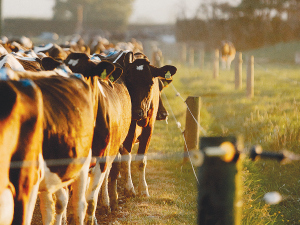DairyNZ Calls for Changes to Government’s Proposed Resource Management Act Reform
DairyNZ says the Government’s proposed Resource Management Act reform needs further work to ensure it delivers on its intent.
 Despite a challenging 2021-22 season, the dairy sector appears to have responded well during a challenging time.
Despite a challenging 2021-22 season, the dairy sector appears to have responded well during a challenging time.
Despite a challenging 2021-22 season, the annual New Zealand Dairy Statistics report shows an innovative dairy sector responding well during a changeable time.
Released last week by DairyNZ and Livestock Improvement Corporation, the report shows that in the 2021-22 season, 20.78 billion litres of milk containing 1.87 billion kgMS was processed by dairy companies.
After reaching a record milk production per herd and per cow in the previous 2020/21 season, production dropped back to 2019/20 levels as the impacts of Covid-19, climatic conditions on farm, inflationary pressures and supply chain issues presented a challenging year for the industry.
The trend of declining cow and herd numbers continued and was accompanied by a 4.3% decrease in litres and 4.1% decrease in kilograms of milksolids processed, compared to the previous season.
DairyNZ chief executive Dr Tim Mackle acknowledges that farmers' achievements in the face of a range of challenges in recent years is positive.
"Through tough times farmers continue to prove their resilience and stay focused on milking better and more efficient cows, by making the most of technology and information," says Mackle.
"Dairy farmers are proud to be world leading and work hard to retain their unique pasture-based farm system, as they keep milk production flowing and therefore creating real value for New Zealanders."
The season saw an increased uptake of herd improvement services, with record herd testing levels of 3.79 million cows. Artificial insemination remained steady at 3.94 million cows.
This continues the trend of New Zealand farmers remaining focused on improving the production efficiency of their herds, and utilising data and insights to support on-farm decisions.
LIC chief executive David Chin says New Zealand farmers responded well to the challenges of the 2021-22 season.
"Rising to challenges in a changing world is nothing new for our sector. Our farmers continue to invest in solutions that will support them to remain global dairy sector leaders.
"Record levels of herd testing uptake and strong investment in artificial breeding demonstrates a continued focus from farmers on herd improvement, to identify poor performing cows and to breed more efficient animals."
The average dairy co-operative payout from Fonterra and Tatua was $9.52/kgMS, which was a record average payout for farmers, while dairy exports reached a record $22 billion in 2021/22.
Key Statistics
Budou are being picked now in Bridge Pā, the most intense and exciting time of the year for the Greencollar team – and the harvest of the finest eating grapes is weeks earlier than expected.
The Real Estate Institute of New Zealand (REINZ) has released its latest rural property report, providing a detailed view of New Zealand’s rural real estate market for the 12 months ending December 2025.
Rural retailer Farmlands has released it's latest round of half-year results, labeling it as evidence that its five-year strategy is delivering on financial performance and better value for members.
OPINION: "We are back to where we were a year ago," according to a leading banking analyst in the UK, referring to US president Donald Trump's latest imposition of a global 10% tariff on all exports into the US.
DairyNZ says the Government’s proposed Resource Management Act reform needs further work to ensure it delivers on its intent.
Overseas Trade Minister Todd McClay says he's working constructively with the Labour Party in the hope they will endorse the free trade agreement (FTA) with India when the agreement comes before Parliament for ratification.
OPINION: Expect the Indian free trade deal to feature strongly in the election campaign.
OPINION: One of the world's largest ice cream makers, Nestlé, is going cold on the viability of making the dessert.